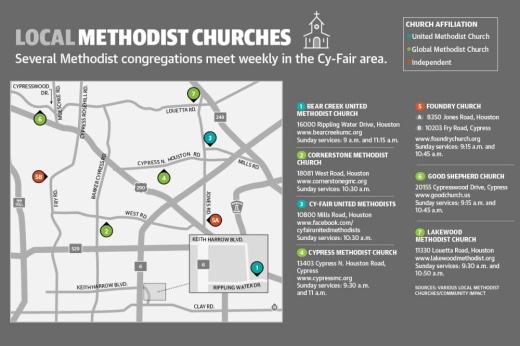“The United Methodist Church is theologically very broad, and over the years it’s become more and more broad theologically. It’s so large now that orthodox Christian faith is becoming less and less a prevailing voice within the United Methodist Church,” said Heather Sims, lead pastor at Cornerstone Methodist Church.
About 82% of this congregation voted to leave the UMC and join the Global Methodist Church, which launched in May. Sims said this denomination is the closest to the UMC while still adhering to core Christian beliefs and is less bureaucratic, allowing local congregations more power to make decisions.
Per regulations set by the UMC’s Texas Annual Conference, congregations needed a two-thirds majority vote in favor of either remaining in the denomination or disaffiliating.
Sims said the denomination has been heading toward a “peaceful separation” to a more progressive and a more traditional Methodist church for years, but when the COVID-19 pandemic delayed those plans until 2024, the GMC chose to launch early.
Denominational decisions
Along with Cornerstone, Good Shepherd United Methodist Church, Lakewood United Methodist Church and Cypress United Methodist Church all voted to disaffiliate from the UMC and join the GMC.
Meanwhile, The Foundry Church voted to leave the UMC and join a network of independently governed churches, and Bear Creek United Methodist Church remained with the UMC.
Local Methodist leaders said the division was driven by UMC leadership’s lack of accountability for clergy to follow the denomination’s discipline.
For instance, in 2016, Karen Oliveto was the first openly lesbian bishop to be elected to the UMC.
But according to The Foundry Lead Pastor Ray Hughes, the denomination’s longstanding church laws state clergy cannot be practicing homosexuals. Officials with The Foundry did not respond to a request for an interview.
“What we’re talking about here is not just fundamentally can we disagree doctrinally, but this is a breakdown of discipline,” Hughes said during a Sept. 18 Q&A posted on YouTube.
“If we agree as a church that there are certain ways of life and certain things that we believe, then when people disagree with those, ... at a high level, they should not be in church leadership or they should be disciplined.”
According to the UMC’s website, the denomination’s position on homosexuality has been debated since 1972—just four years after the denomination was created.
The GMC “believe[s] that human sexuality is a gift of God that is to be affirmed as it is exercised within the legal and spiritual covenant of a loving and monogamous marriage between one man and one woman,” its website states.
A new UMC congregation
When Godfrey Hubert—who served as senior pastor of The Foundry from 1984-2018—realized Cy-Fair residents who wanted to stay within the UMC had few options, he helped coordinate a new faith community.
Cy-Fair United Methodists met for their first worship service in November at the Cypress Alamo. Shuler Sitsch served as an associate pastor for Lakewood United Methodist Church from mid-2018 through November and chose not to leave the UMC.
He said he hoped the denomination would find common ground and ensure unity in the denomination despite disagreements, but over the last year he accepted that would not be the case.
“The writing has been on the wall for a long time in the United Methodist Church that something like this was going to come to pass with the disaffiliation—with what people are calling a ‘split,’” he said.
Sitsch was reappointed to lead the Cy-Fair United Methodists, which he said is expected to be chartered this spring.
He said the first couple of months in this role have consisted of helping attendees navigate the grieving process after leaving churches some had attended for decades.
“While they were in the minority of people in their previous church that didn’t want to disaffiliate, there was still a large number of people who were going through the same experiences that they were in that pain and that hurt,” Sitsch said.
In addition to the grief process, Sitsch also helped identify what his congregation loved about their former churches to incorporate those elements—children’s ministry, student ministry and helping meet the needs of the community with hospital visits, prayer and food drives. By January, the group averaged about 200 attendees each Sunday and outgrew the Cypress Alamo space. It relocated to Bleyl Middle School starting Feb. 5.
“We also want to be a group of people where, from the moment that you walk in our doors or the moment that you park your car at our worship service, you feel like you can belong here—regardless of who you are, what you believe, where you’ve been, what you’ve done,” he said.





